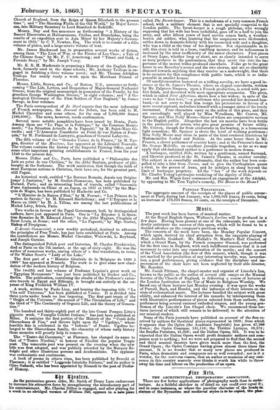31tusit.
The past week has been barren of musical matter.
At the Royal English Opera, Wallace's Lurline will be produced in a few days. Having been present at one of the rehearsals, we can confi- dently anticipate the success of this opera, which will be found to be a decided advance on the composer's previous works.
The concerts of the week have been, the Monday Popular Concert, which again derived its chief attraction from the exquisite playing of Miss Arabella Goddard; Mr. Hullah'e St. Martin's Hall Concert, at which a Grand Mass, by the French composer Gnonod, was performed for the first time in England, with such indifferent success that it is not necessary to enter into any examination of its merits ; and the concert
of the Vocal Association (the first of this season), which, though it was not marked by the production of any interesting novelty, was, neverthe-
less, a good performance, giving evidence that the discipline and im- provement of the choir have not been neglected by their able director, Mr. Benedict.
Mr. Josiah Pittman, the chapel-master and organist of Lincoln's Inn, known to the public as the author of several able essays on the Musical Service of the Church of England, is delivering a course of lectures at the London Institution on the Use of Music in Religious Worship. We heard one of these lectures last Monday evening : it was upon the works of Purcell, Bach, and Handel, and the influence of their labours on the state of ecclesiastical music. The lecturer handled the subject with great ability, and enhanced the interest of his remarks by interspersing them with illustrative performances of pieces selected from those authors ; the performers being several eminent cathedral singers, and the young gen- tlemen of the Lincoln's Inn Chapel choir. We recommend these lec- tures (several of which still remain to be delivered) to the attention of our musical readers.
Some of the Paris journals have published an account of the fees re- ceived by authors for theatrical pieces represented in 1869; from which it appears that the Opera (the Academie Imperiale) has given 47,290 francs ; the Opera Comique, 131,110; the Theatre Lyrique, 59,976; the Bouffes Parisiens, 41,968 ; and the Italian Opera, 392. It was to be expected that the Italian Opera would profit dramatic anthers and com- posers next to nothing ; but we were not prepared to find that the second and third musical theatres have given much more than the first, the Grand Opera ; the Opera Comique having given almost three times the amount. It is no wonder that so many new pieces are produced in Paris, when dramatists and composers are so well rewarded ; nor is it a wonder, for the converse reason, that an author or musician of any emi- nence in this country scarcely ever thinks it worth his while to throw away his time and labour on the production of an opera.


























 Previous page
Previous page